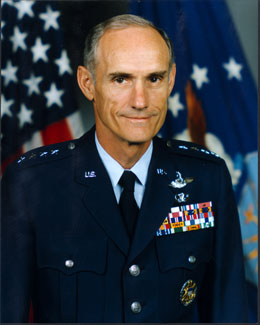Merrill A. McPeak
|
|
General Merrill Anthony "Tony" McPeak (born January 9, 1936) is a former Chief of Staff of the United States Air Force. He retired from the service on November 1, 1994.
McPeak was born in Santa Rosa, California. After graduating from Union High School in Grants Pass, Oregon, he entered San Diego State College earning a B.A. in economics in 1957. He was commissioned through the Air Force ROTC program at the college, and entered active duty in November of that year. After completing preflight and pilot training on F-100 Super Sabre and F-104 Starfighter aircraft, he was assigned as a fighter pilot and staff officer at bases in the United Kingdom. Later he returned to the U.S. as a weapons officer at Luke Air Force Base, Arizona.
From December 1966 to December 1968 McPeak was assigned as a solo and lead solo pilot with the Thunderbirds, the Air Force's acrobatic flying team. While with the Thunderbirds he performed in close to 200 air shows in the U.S. and overseas.
Upon completion of his tour with the Thunderbirds he was assigned as an F-100 tactical fighter pilot with the 37th Tactical Fighter Wing at Phu Cat Air Base in the Republic of Vietnam. Later his unit was transferred to the 31st Tactical Fighter Wing at Tuy Hoa Air Base, where he served as chief of standardization and evaluation for the wing. McPeak completed a total of 269 combat missions while in Vietnam in roles as an attack pilot and as a high-speed forward air controller, remaining in-country until 1970, when he attended the Armed Forces Staff College in Norfolk, Virginia.
From 1970-73 McPeak was an air operations staff officer for the Mideast Division at Headquarters USAF in Washington. After graduating from the National War College in 1974, he was named assistant deputy commander for operations for the 1st Tactical Fighter Wing at MacDill AFB, Florida. He later (1975-76) was a military fellow with the Council on Foreign Relations.
In July 1976 he became commander of the 513th Combat Support Group based at RAF Station Mildenhall; a year later he moved to Zaragoza Air Base in Spain as vice commander of the 406th Tactical Fighter Training Wing. From 1978-80 he was assistant chief of staff for current operations, Allied Air Forces Central Europe (in Boerfink, West Germany). 1980-81 saw him commanding the 20th Tactical Fighter Wing based at RAF Station Upper Heyford. McPeak was chief of staff at USAFE headquarters from 1981-82, and deputy chief of staff for plans at TAC headquarters, Langley AFB, Virginia from 1982-85. He returned to Headquarters USAF in 1985-87 as deputy chief of staff for programs and resources.
In June 1987 McPeak moved to Bergstrom AFB, Texas in the dual roles of 12th Air Force commander and commander of Air Forces for United States Southern Command. A year later he was named commander-in-chief of PACAF, and he was appointed as Air Force Chief of Staff in by President George H.W. Bush in October of 1990, replacing the retiring General Michael Dugan.
McPeak took over as Chief of Staff during the run-up for Operation Desert Shield, and assisted in overall strategic planning for Operation Desert Storm. His tenure also saw major reduction in force as a result of the end of the Cold War; during his time as Chief of Staff, he oversaw the disbandment of Strategic Air Command and Air Force Systems Command, which were replaced by Air Combat Command and Air Force Materiel Command. McPeak emphasized modernization, streamlining, and emphasis on operations and combat readiness in his decisions as Chief of Staff.
McPeak also acted as Secretary of the Air Force for three weeks in 1993, during an interim before the formal appointment and confirmation of Sheila E. Widnall, thus becoming the only person to have ever concurrently served in both capacities. McPeak continued as Chief of Staff through October 1994, retiring afterwards.
Following his Air Force career, McPeak entered the private sector as a consultant and executive. He has been on the boards of directors for Centerspan Communications, ECC International, Tektronix and other organizations.
During the presidential election of 2000 General McPeak, along with several other high-ranking military retirees, broke with a long-standing tradition of political neutrality to endorse George W. Bush. As the military and foreign policy of the Bush administration coalesced, however, McPeak expressed strong objections, especially with regard to the 2003 invasion of Iraq. McPeak later openly campaigned for Howard Dean's nomination, and since Dean's withdrawal acted as an adviser for the John Kerry campaign. He was also one of twenty-sevens signatories to the statement of the "Committee of Diplomats & Commanders for Change" calling the Bush Administration a failure at "preserving national security" and calling for Bush not to be re-elected.
He holds a master's degree in international relations from George Washington University.
Succession
| Preceded by: Gen. John M. Loh (acting) | Chief of Staff of the United States Air Force 1990–1994 | Succeeded by: Gen. Ronald R. Fogleman Military DecorationsMcPeak's military decorations include the:
Qualification badges include the Command Aviator Badge and the Office of the Joint Chiefs of Staff Identification Badge External link
|

